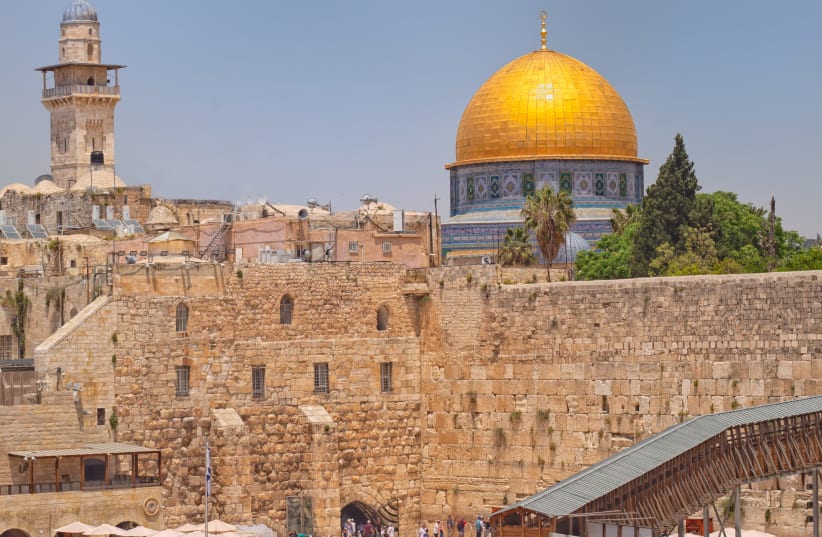Palestinian Authority President Mahmoud Abbas on Wednesday received a letter from Jordan’s King Abdullah concerning the upcoming Palestinian elections and efforts to revive the Middle East peace process, Palestinian and Jordanian sources said.
The letter was relayed to Abbas by Jordanian Foreign Minister Ayman Safadi, who made a surprise visit to Ramallah, the sources said.
The letter, the sources added, affirmed Jordan’s support for the upcoming parliamentary and presidential elections, slated for May 22 and July 31 respectively.
Safadi’s visit to Ramallah came in the aftermath of the alleged “coup” to overthrow Abdullah’s regime. The PA leadership has voiced full support for Abdullah against attempts to “destabilize the stability and security” of Jordan.
Earlier this month, King Abdullah’s half-brother, Prince Hamza bin Hussein, was placed under house arrest on suspicion that he and some Jordanians had plotted to undermine stability and security in the kingdom.
The visit also comes amid growing speculation that the PA leadership is planning to delay or cancel the Palestinian elections because of Israel’s refusal to respond to its request to allow the vote to take place in Jerusalem.
“Jordan stands with all its capabilities in order to ensure the success of the elections and is working to remove all obstacles,” Safadi said, referring to the dispute over the inclusion of Jerusalem in the Palestinian vote.
“Jerusalem is a red line for Jordan, the king and our people, as it is a red line for the State of Palestine,” he stressed.
Safadi expressed Jordan’s rejection of “all Israeli measures and attempts to change the Arab, Islamic, and Christian identity of occupied Jerusalem and the historical status of the holy sites in Jerusalem.”
He vowed that Jordan would “confront any effort to harm the historical and legal status of the Muslim and Christian holy sites in Jerusalem.”
Safadi said that King Abdullah’s letter to Abbas was related to “joint efforts that the Kingdom and our [Palestinian] brothers are making to take practical steps capable of breaking the deadlock and creating a political horizon that allows for the restoration of the negotiations [with Israel].”
The Jordanian foreign minister said that the Palestinians and Jordan were seeking “a just peace, which can only be achieved if the Palestinian people obtain their full legitimate rights, foremost among them their right to an independent and sovereign state with occupied Jerusalem as its capital on the borders of June 4, 1967.”
He pointed out that circumstances have changed, regionally and internationally, especially since the arrival of the new US administration.
The US administration, he said, has been sending “positive messages that require us to interact with them positively.”
Safadi stressed the need to “create international action to stop the unilateral Israeli steps that undermine the two-state solution, specifically the construction and expansion of settlements.”
Jordan, he disclosed, is also working to help the Palestinians combat eviction orders issued against several Arab families in the east Jerusalem neighborhood of Sheikh Jarrah.
“We have provided all the documents that we possess to help Palestinian citizens [in Jerusalem] preserve their full rights,” Safadi said.
Israeli courts have ruled that several families in Sheikh Jarrah should be evacuated because the land their homes were built on is owned by the Sephardic Community Committee and the Knesset Yisrael Committee.
In 1948, the Jordanians designated the disputed land in Sheikh Jarrah for the resettlement of dozens of Arab families.
After 1967, the two Jewish organizations recovered the ownership rights of the land based on the Legal and Administrative Matters Law and demanded that the families vacate their homes. Enacted in 1970, the law stipulates, among other things, that Jews who lost their property in east Jerusalem in 1948 could restore their ownership.
The Jordanian foreign ministry said on Tuesday that the Jordanian authorities, upon the request of the Palestinians, handed over to the PA embassy in Amman certified copies of documents of leasing contracts, correspondence, records and lists of names of tenants at Sheikh Jarrah.
According to the ministry, the documents show that the former Jordanian Ministry of Construction and Reconstruction had concluded leasing contracts for housing units to a number of families in Sheikh Jarrah in 1956.
Hussein al-Sheikh, head of the PA Civil Affairs Authority, said that King Abdullah’s letter to Abbas “confirmed the depth of the historical relationship and coordination at the highest level between the Hashemite Kingdom of Jordan and the State of Palestine, and dealt with the political developments taking place in the region, as well as some issues related to bilateral relations.”
On the controversy surrounding the participation of Jerusalem Arabs in the elections, PA presidential spokesperson Nabil Abu Rudaineh said that the elections will take place on time. “Efforts are underway with all parties, including the European Union, which is trying to make every possible effort, but is unable to force Israel to allow the elections in Jerusalem,” Abu Rudaineh said.
The US administration, he added, has not responded regarding pressuring Israel “not to obstruct the holding of the elections, despite the fact that this administration is better than the previous one because President Joe Biden has declared his commitment to the two-state solution and the resumption of financial aid to the Palestinian people.”
On Tuesday, Nabil Sha’ath, a senior adviser to Abbas, announced that it was “very likely” that the elections would be postponed due to Israel’s failure to respond to the PA’s request to hold the vote in Jerusalem.
